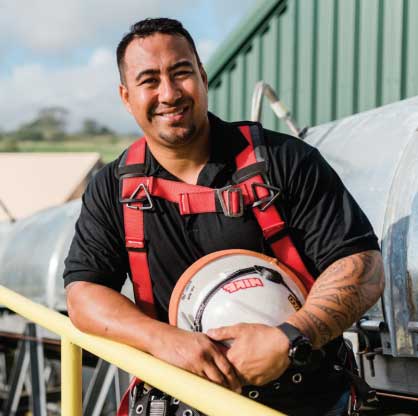Hawai‘i’s Only Energy Project Committed to Be Carbon Negative
Bioenergy is created from using fast-growing renewable plant crops instead of fossil fuel oil to generate electricity. If more plants are grown than harvested, they will remove more carbon from the atmosphere than emitted, resulting in a carbon negative operation that lowers greenhouse gas emissions.
This is what Honua Ola Bioenergy is committed to do.
Bioenergy is considered a renewable energy by the state of Hawai‘i. One of the crops proven most successful at effectively absorbing carbon is eucalyptus, which grows quickly – 12 to 18 feet a year – and can be harvested in just seven years. Honua Ola will primarily be fueled by locally grown eucalyptus planted decades ago as a crop to replace sugar cane, and can also help our community to get rid of undesirable invasive species such as albizia.
By growing new eucalyptus crops, as well as planting millions of native trees that won’t ever be harvested, Honua Ola will not just be carbon neutral but actually carbon negative – the first energy project in Hawai‘i ever to do so.
What’s more, renewable energy from Honua Ola will replace oil-fred power generation, further lowering greenhouse gas emissions. This reduction in emissions is backed by analyses from environmental experts.
Honua Ola’s commitments aren’t just promises or wishful thinking, and we aren’t asking the public or the State to just take our word for them. We have agreed to making these commitments formal conditions of our project’s approval.
And to remove any doubt over the commitments happening, we agreed to the PUC’s continued oversight and have also agreed to the PUC adding any of its own additional conditions to ensure that Honua Ola will be held accountable, and these commitments will be enforced.
Honua Ola has invested over half a billion dollars to bring our renewable energy facility to 99% completion. We are ready to start generating clean renewable electricity for Hawai‘i, now.

“For every tree we harvest, we’ll plant more. The jobs
we have today will be here for our kids tomorrow.”
– Ashley McGuire,
Electrical and Instrumentation Technician
